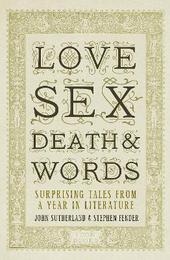
|
Love, Sex, Death and Words: Surprising Tales From a Year in Literature
Hardback
Main Details
| Title |
Love, Sex, Death and Words: Surprising Tales From a Year in Literature
|
| Authors and Contributors |
By (author) Jon Sutherland
|
|
By (author) Stephen Fender
|
| Physical Properties |
| Format:Hardback | | Pages:496 | | Dimensions(mm): Height 240,Width 161 |
|
| ISBN/Barcode |
9781848311640
|
| Classifications | Dewey:809 |
|---|
| Audience | |
|---|
| Illustrations |
Illustrations, unspecified
|
|
Publishing Details |
| Publisher |
Icon Books
|
| Imprint |
Icon Books
|
| Publication Date |
7 October 2010 |
| Publication Country |
United Kingdom
|
Description
In this absorbing companion to literature's rich past, arranged by days of the year, acclaimed critics and friends Stephen Fender and John Sutherland turn up the most inspiring, enlightening, surprising and curious artefacts that literature has to offer. Find out why 16 June 1904 mattered so much to Joyce, which great literary love affair was brought to a tragic end on 11 February 1963 and why Roy Campbell punched Stephen Spender on the nose on 14 April 1949 in this sumptuous voyage through the highs and lows of literature's dazzling past.
Author Biography
John Sutherland was the Lord Northcliffe Professor of Modern English Literature at UCL and a past Chairman of the Booker Prize panel, and is the author of one of the standard texts on Victorian fiction. Stephen Fender has taught Literature in the US, in Scotland at the University of Edinburgh, and in England at London and Sussex, where he was head of American Studies from 1985 to 2003.
ReviewsThis book (co-authored with an old pal, Stephen Fender; Sutherland excels in the Victoriana, while Fender is the Americanist) should bring delight to many, sell tons and keep as many ex-wives as any of us could wish for in scones and jam... It's a smart idea, well executed. Its prime virtue is the dense agglomeration of trivia around even well-known events. -- Sam Leith, Spectator I've had tremendous fun reading [the entries] - arguing with some, substituting others, quoting them over lunch - and pleasure is at the heart of this project. It's irresistible, as compulsive as eating popcorn. Hawthorne and Melville meet for the first time, Petrarch catches first sight of Laura, Picasso, Joyce, Stravinsky and Diaghilev and Proust dine together at the Majestic, Anthony Burgess (like Scott and Whitman before him) gives a glowing review to his own book, Defoe invents the novel, but doesn't know what to call it, Bertolt Brecht testifies before HUAC, Jeffrey Archer 'goes down'. -- Guardian 'Love Sex Death Words: Surprising Tales from a Year in Literature' - the title itself is irresistible - by John Sutherland and Stephen Fender (Icon Books), is an enjoyable and entirely arbitrary romp through a leap year of anecdotes, from January 1st and the vexed history of the copyright of Peter Pan to the December 31st publication of Richard Yates's 1961 novel Revolutionary Road, with stops along the way to visit Nietzsche at his typing lessons and Alexander Pope at his doctor's. Good, clean, harmless fun. -- John Banville, Irish Times Bibliophiles are recommended to test the learned waters of 'Love, Sex, Death and Words' (Icon, GBP20) by John Sutherland and Stephen Fender, which takes us on an urbane, day-by-day amble through the year, recounting events of literary import. Here you will find an abundance of mortarboard humour and recondite jewels: the truth behind Thomas Carlyle's wedding night, for instance. -- Sunday Telegraph Doesn't the Trades Descriptions Act cover book titles? How can 'Love, Sex, Death & Words' be justified for a volume of literary dates, all based on the solitary act of an author sitting down quietly with a quill, pencil, typewriter or keyboard? In fact, not only the fourth noun but also the first three are mots justes for the entrancing events detailed here. -- Independent A huge anthology of essays about writers and books, 365 in fact, one for every day of the year, although few readers will be unable to resist reading on through several articles every time they pick up the book. -- Common Reader
|